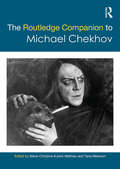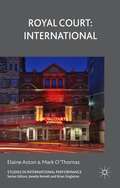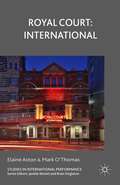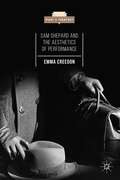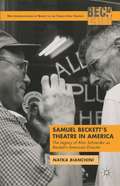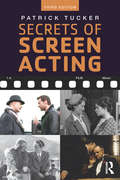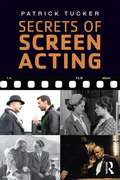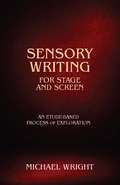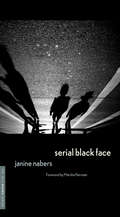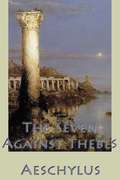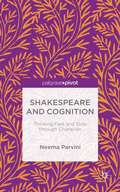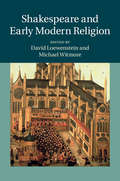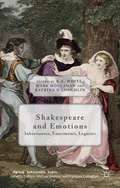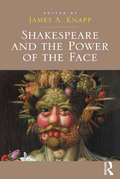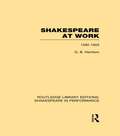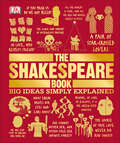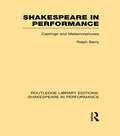- Table View
- List View
The Routledge Companion to Michael Chekhov (Routledge Companions)
by Marie Christine Autant Mathieu Yana MeerzonThe Routledge Companion to Michael Chekhov brings together Chekhov specialists from around the world - theatre practitioners, theorists, historians and archivists – to provide an astonishingly comprehensive assessment of his life, work and legacy. This volume aims to connect East and West; theatre theory and practice. It reconsiders the history of Chekhov’s acting method, directing and pedagogy, using the archival documents found across the globe: in Russia, England, America, Germany, Lithuania and Switzerland. It presents Chekhov’s legacy and ideas in the framework of interdisciplinary theatre practices and theories, as well as at the crossroads of cultures, in the context of his forays into such areas as Western mime and Asian cosmology. This remarkable Companion, thoughtfully edited by two leading Chekhov scholars, will prove invaluable to students and scholars of theatre, theatre practitioners and theoreticians, and specialists in Slavic and transcultural studies. Marie-Christine Autant-Mathieu is Director of Research at the National Center For Scientific Research, and Assistant-Director of Sorbonne-CNRS Institute EUR’ORBEM. She is an historian of theatre and specialist in Russian and Soviet theatre.Yana Meerzon is Associate Professor in the Department of Theatre, University of Ottawa. Her book publications include Adapting Chekhov: The Text and Its Mutations, co-edited with Professor J. Douglas Clayton, University of Ottawa (Routlegde, 2012).
Royal Court: International
by Elaine Aston Mark O’thomasRoyal Court: International is the first full-length study of the Royal Court Theatre's International Department. It charts the engagement of the UK's premiere theatre for new writing with an internationalist agenda and takes readers inside the process developed by the Court for the workshop projects it has undertaken in different parts of the world since the late 1990s. Covering the theatre's unique programming of international plays and seasons, it highlights new writing from different parts of the globe, including France, Spain, Germany, Russia, Eastern Europe, Brazil, Cuba, Mexico, Columbia, Iran, the Near East, North Africa, Nigeria and India. First-hand accounts of the work appear in contributions from Stephen Daldry, Elyse Dodgson and Vicky Featherstone, and in interviews with Marcos Barbosa (Brazil), Anupama Chandrasekhar (India), Dominic Cooke, Sasha Dugdale, Marius von Mayenburg (Germany), Mark Ravenhill and Indhu Rubasingham.
Royal Court: International (Studies In International Performance)
by Elaine Aston Mark O’ThomasThe first ever full-length study of the Royal Court Theatre's International Department, covering the theatre's unique programming of international plays and seasons, its London-based residences for writers from overseas, and the legacies of workshops conducted in more than 30 countries.
Royal Court: International (Studies in International Performance)
by E. Aston Mark O'ThomasThe first ever full-length study of the Royal Court Theatre's International Department, covering the theatre's unique programming of international plays and seasons, its London-based residences for writers from overseas, and the legacies of workshops conducted in more than 30 countries.
Sam Shepard and the Aesthetics of Performance
by Emma CreedonThis book argues that a consideration of Sam Shepard's plays in the context of visual and theoretical Surrealism significantly succours our understanding of his experimental approach. Emma Creedon's study reveals how Shepard's plays rely on a veneer of realism that the playwright then actively exploits and rejects. In this mode, these plays indicate a sophisticated deconstruction of American realism and a manipulation of dramatic conventions; moreover, the incantatory functioning of his dramatic language reveals the influence of such Surrealists as Antonin Artaud. Indeed, this, along with his long admiration for and textual references to Samuel Beckett's plays, positions him as a dramatist working within the European tradition of Absurdism.
Samuel Beckett’s Theatre in America
by Natka BianchiniA study of the 30-year collaboration between playwright Samuel Beckett and director Alan Schneider, Bianchini reconstructs their shared American productions between 1956 and 1984. By examining how Beckett was introduced to American audiences, this book leads into a wider historical discussion of American theatre in the mid-to-late 20th century.
Secrets of Screen Acting
by Patrick TuckerWhen it was first published in 1993, Secrets of Screen Acting broke new ground in explaining how acting for the camera is different from acting on stage. Reaction time is altered, physical timing and placement are reconceived, and the proportions of the digital frame itself become the measure of all things, so the director must conceptualize each image in terms of this new rectangle and actors must 'fit' into the frame. Based on a revolutionary non-Method approach to acting, this book shows what actually works: how an actor, an announcer--anyone working in front of the cameras--gives excellent performances on screen.Instead of starting with what is real and trying to wrestle that onto the screen, Patrick Tucker explains how to work with the realities of a shoot and work from there towards the real. His step-by-step guide to the elements of effective screen acting is an extension and explanation of a lifetime of work in the field, containing over 50 acting exercises and the tried-and-tested Screen Acting Checklist. As well as being completely updated to cover new techniques, film references and insights, this third edition now includes a set of Film Clip Time Codes for each film. These not only itemise the films discussed in each chapter, but also pinpoint the precise moments where each example can be found so that students, teachers, and professional actors can refer to them quickly and easily.
Secrets of Screen Acting Third Edition
by Patrick TuckerWhen it was first published in 1993, Secrets of Screen Acting broke new ground in explaining how acting for the camera is different from acting on stage. Reaction time is altered, physical timing and placement are reconceived, and the proportions of the digital frame itself become the measure of all things, so the director must conceptualize each image in terms of this new rectangle and actors must 'fit' into the frame. Based on a revolutionary non-Method approach to acting, this book shows what actually works: how an actor, an announcer--anyone working in front of the cameras--gives excellent performances on screen.
Sensory Writing for Stage and Screen: An Etude-Based Process of Exploration
by Michael WrightThrough a series of systematic explorations across a wide range of scenarios, Sensory Writing for Stage and Screen offers script writers exercises for attending to their own sensory experiences as a means to exploring the sensory experiences—and worlds—of the characters they create.
Serial Black Face
by Janine Nabers Marsha NormanThe 2014 winner of the Yale Drama Series "The play does not have a tragic ending, though you will be certain that it must. But it is a tragic story. It is the tragedy of lives lived without hope of deliverance. . . . I will leave you to read the play and determine how on earth we get to a satisfying ending to this tragic tale of a woman without a chance. But that ending is the genius of Nabers's work, her faith in the ability of people with no chance, to find one. "-Marsha Norman, from the Foreword The year is 1979 and a serial killer in Atlanta is abducting and murdering young black children. Against a backdrop of fear and uncertainty, playwright Janine Nabers explores the emotional battleground where an African-American single mother wars with her teenage daughter, each coping in her own way with personal tragedy and loss. The volatility of their situation is intensified when a severely damaged and devastatingly handsome stranger becomes an integral part of their lives. "Serial Black Face" is the seventh winner of the DC Horn Foundation/Yale Drama Series Prize, selected by Pulitzer Prize-winning playwright Marsha Norman. At once startling, engrossing, suspenseful, and exhilarating, Nabers's powerful drama employs a real-life nightmare, the Atlanta Child Murders of the late 1970s, to incisively examine human frailty and the prickly complexities of a mother-daughter relationship. A stunning theatrical work, both thoughtful and profoundly moving, "Serial Black Face" is richly deserving of this year's prize. "
The Seven Against Thebes
by AeschylusAeschylus was the first of the three ancient Greek tragedians whose plays can still be read or performed, the others being Sophocles and Euripides. He is often described as the father of tragedy: our knowledge of the genre begins with his work and our understanding of earlier tragedies is largely based on inferences from his surviving plays. Only seven of his estimated seventy to ninety plays have survived into modern times. Fragments of some other plays have survived in quotes and more continue to be discovered on Egyptian papyrus, often giving us surprising insights into his work.
Shakespeare and Cognition: Thinking Fast and Slow through Character
by Neema ParviniShakespeare and Cognition.
Shakespeare and Early Modern Religion
by David Loewenstein Michael WitmoreWritten by an international team of literary scholars and historians, this collaborative volume illuminates the diversity of early modern religious beliefs and practices in Shakespeare's England, and considers how religious culture is imaginatively reanimated in Shakespeare's plays. Fourteen new essays explore the creative ways Shakespeare engaged with the multifaceted dimensions of Protestantism, Catholicism, non-Christian religions including Judaism and Islam, and secular perspectives, considering plays such as Hamlet, Julius Caesar, King John, King Lear, Macbeth, Measure for Measure, A Midsummer Night's Dream and The Winter's Tale. The collection is of great interest to readers of Shakespeare studies, early modern literature, religious studies, and early modern history.
Shakespeare and Emotions
by R. S. White Mark Houlahan Katrina O’loughlinThis collection of original essays by established and emerging scholars approaches the works of Shakespeare from the topical perspective of the History of Emotions. What emerges is not a single paradigm or 'grand narrative', but a variety of approaches, ranging from the historical to the interpretive, illuminating the primacy of emotions in Shakespearean scholarship and theatre. The section 'Emotional Inheritances' looks back to Shakespeare's sources and cultural backgrounds, showing that some aspects of his representations of emotions come from the classics and medieval world; 'Shakespearean Enactments' presents essays that analyse a range of emotional states and issues in the plays themselves; while 'Legacies and Re-Enactments' traces aspects of his influence through later times and down to the present day. Taken together these diverse but related essays present a kaleidoscope of suggestive approaches to the potentially endless subject of emotions in Shakespeare.
Shakespeare and Textual Studies
by Kidnie Margaret Jane Sonia MassaiShakespeare and Textual Studies gathers contributions from the leading specialists in the fields of manuscript and textual studies, book history, editing, and digital humanities to provide a comprehensive reassessment of how manuscript, print and digital practices have shaped the body of works that we now call 'Shakespeare'. This cutting-edge collection identifies the legacies of previous theories and places special emphasis on the most recent developments in the editing of Shakespeare since the 'turn to materialism' in the late twentieth century. Providing a wide-ranging overview of current approaches and debates, the book explores Shakespeare's poems and plays in light of new evidence, engaging scholars, editors, and book historians in conversations about the recovery of early composition and publication, and the ongoing appropriation and transmission of Shakespeare's works through new technologies.
Shakespeare and the Idea of Apocrypha
by Peter KirwanIn addition to the thirty-six plays of the First Folio, some eighty plays have been attributed in whole or part to William Shakespeare, yet most are rarely read, performed or discussed. This book, the first to confront the implications of the 'Shakespeare Apocrypha', asks how and why these plays have historically been excluded from the canon. Innovatively combining approaches from book history, theatre history, attribution studies and canon theory, Peter Kirwan unveils the historical assumptions and principles that shaped the construction of the Shakespeare canon. Case studies treat plays such as Sir Thomas More, Edward III, Arden of Faversham, Mucedorus, Double Falsehood and A Yorkshire Tragedy, showing how the plays' contested 'Shakespearean' status has shaped their fortunes. Kirwan's book rethinks the impact of authorial canons on the treatment of anonymous and disputed plays.
Shakespeare and the Natural World
by Tom MacfaulExploring the rich range of meanings that Shakespeare finds in the natural world, this book fuses ecocritical approaches to Renaissance literature with recent thinking about the significance of religion in Shakespeare's plays. MacFaul offers a clear introduction to some of the key problems in Renaissance natural philosophy and their relationship to Reformation theology, with individual chapters focusing on the role of animals in Shakespeare's universe, the representation of rural life, and the way in which humans' consumption of natural materials transforms their destinies. These discussions enable powerful new readings of Shakespeare's plays, including A Midsummer Night's Dream, As You Like It, King Lear, Macbeth, The Tempest, The Winter's Tale, and the history plays. Proposing that Shakespeare's representation of the relationship between man and nature anticipated that of the Romantics, this volume will interest scholars of Shakespeare studies, Renaissance drama and literature, and ecocritical studies of Shakespeare.
Shakespeare and the Power of the Face
by James A. KnappThroughout his plays, Shakespeare placed an extraordinary emphasis on the power of the face to reveal or conceal moral character and emotion, repeatedly inviting the audience to attend carefully to facial features and expressions. The essays collected here disclose that an attention to the power of the face in Shakespeare’s England helps explain moments when Shakespeare’s language of the self becomes intertwined with his language of the face. As the range of these essays demonstrates, an attention to Shakespeare’s treatment of faces has implications for our understanding of the historical and cultural context in which he wrote, as well as the significance of the face for the ongoing interpretation and production of the plays. Engaging with a variety of critical strands that have emerged from the so-called turn to the body, the contributors to this volume argue that Shakespeare’s invitation to look to the face for clues to inner character is not an invitation to seek a static text beneath an external image, but rather to experience the power of the face to initiate reflection, judgment, and action. The evidence of the plays suggests that Shakespeare understood that this experience was extremely complex and mysterious. By turning attention to the face, the collection offers important new analyses of a key feature of Shakespeare’s dramatic attention to the part of the body that garnered the most commentary in early modern England. By bringing together critics interested in material culture studies with those focused on philosophies of self and other and historians and theorists of performance, Shakespeare and the Power of the Face constitutes a significant contribution to our growing understanding of attitudes towards embodiment in Shakespeare’s England.
Shakespeare and the Visual Imagination
by Stuart SillarsShakespeare's knowledge of the practices of visual art, its fundamental concepts and the surrounding debates is clear from his earliest works. This book explores this relationship, showing how key works develop visual compositions as elements of dramatic movement, construction of ideas, and reflections on the artifice of theatre and language. The Taming of the Shrew, Love's Labour's Lost, Richard II and A Midsummer Night's Dream are explored in detail, offering new insights into their forms, themes, and place in European traditions. The use of emblems is examined in Titus Andronicus and As You Like It; studies of Venus and Adonis, some sonnets and The Rape of Lucrece reveal different but related visual aspects; a later chapter suggests how the new relation between seeing and soliloquy in The Rape of Lucrece is developed in other plays. Extensively illustrated, the book explores Shakespeare's assimilation and exploration of visual traditions in structure, theme and idea throughout the canon.
Shakespeare at Work, 1592-1603 (Routledge Library Editions: Shakespeare in Performance)
by G.B. HarrisonShakespeare against the background of his times, his world of the theatre and his dramatic development through the last years of Elizabeth’s reign. Originally published in 1933 and republished in 1958, this great work is an imagining, in plain narrative, of the life of Shakespeare backed with evidence of the history of the stage. Whatever wider significances modern critics distill from Shakespeare’s plays, it remains an elementary fact that he wrote plays to interest and entertain his contemporaries and this book takes a look at the immediate interests of his audience and how his work responded to them.
The Shakespeare Book: Big Ideas Simply Explained (DK Big Ideas)
by DKLearn the entire works of one of the greatest writers of the English language in The Shakespeare Book.Part of the fascinating Big Ideas series, this book tackles tricky topics and themes in a simple and easy to follow format. Learn about the works of William Shakespeare in this overview guide, great for beginners looking to learn and experts wishing to refresh their knowledge alike! The Shakespeare Book brings a fresh and vibrant take on the topic through eye-catching graphics and diagrams to immerse yourself in. This captivating book will broaden your understanding of Shakespeare, with:- Every play and poem from Shakespeare&’s canon, including lost plays and less well-known works of poetry- Packed with facts, charts, timelines and graphs to help explain core concepts- A visual approach to big subjects with striking illustrations and graphics throughout- Easy to follow text makes topics accessible for people at any level of understandingThe Shakespeare Book is the perfect introduction to the entire canon of Shakespeare&’s plays, sonnets, and other poetry, aimed at adults with an interest in the subject and students wanting to gain more of an overview. Here you&’ll discover the complete works, from The Comedy of Errors, to the great tragedies of Hamlet, Othello, King Lear, and Macbeth.Your Shakespeare Questions, Simply ExplainedThis is a brilliant, innovative exploration of the entire canon of Shakespeare plays, sonnets, and other poetry with detailed plot summaries and a full analysis of the major characters and themes. If you thought it was difficult to learn about the works of one of the greatest writers in the English language, The Shakespeare Book presents key information in a simple layout. Every work is covered, from the comedies of Twelfth Night and As You Like It to the tragedies of Julius Caesar and Hamlet, with easy-to-understand graphics and illustrations bringing the themes, plots, characters, and language of Shakespeare to life.The Big Ideas SeriesWith millions of copies sold worldwide, The Shakespeare Book is part of the award-winning Big Ideas series from DK. The series uses striking graphics along with engaging writing, making big topics easy to understand.
Shakespeare in Performance: Castings and Metamorphoses (Routledge Library Editions: Shakespeare in Performance)
by Ralph BerryThese studies take stage history as a means of knowing the play. Half of the studies deal with casting - doubling, chorus and the crowd, the star of Hamlet and Measure for Measure. Then the transformations of dramatis personae are analyzed and The Tempest is viewed through the changing relationships of Prospero, Ariel and Caliban. Some of Shakespeare’s most original strategies for audience control are studied, such as Cordelia's asides in King Lear, Richard II’s subversive laughter and the scenic alternation of pleasure and duty in Henry IV. Performance is the realization of identity. The book draws on major productions up to 1992, just before the book was originally published.
Shakespeare on Screen
by Sarah Hatchuel Vienne-Guerrin NathalieThe first volume in the re-launched series Shakespeare on Screen is devoted to Othello, offering up-to-date coverage of recent screen versions as well as new critical essays on older, canonical films. An international cast of authors explores not only productions from the USA and UK, but also translations, adaptations and appropriations in Qu#65533;bec, Italy, India, Brazil and Mexico. The volume takes part in the ceaseless cultural investigation of what Othello says about Shakespeare, the past and our present time, supported by an invaluable film-bibliography. Accompanying free online resources include a fuller version of the bibliography and an additional contribution on YouTube versions of Othello. This book will be a valuable resource for students, scholars and teachers of film studies and Shakespeare studies.
Shakespeare on Screen Othello
by Hatchuel, Sarah and Vienne-Guerrin, Nathalie Sarah Hatchuel Nathalie Vienne-Guerrin"The first volume in the re-launched series Shakespeare on Screen is devoted to Othello, offering up-to-date coverage of recent screen versions as well as new critical essays on older, canonical films. An international cast of authors explores not only productions from the USA and UK, but also translations, adaptations and appropriations in Québec, Italy, India, Brazil and Mexico. The volume takes part in the ceaseless cultural investigation of what Othello says about Shakespeare, the past and our present time, supported by an invaluable film-bibliography. Accompanying free online resources include a fuller version of the bibliography and an additional contribution on YouTube versions of Othello. This book will be a valuable resource for students, scholars and teachers of film studies and Shakespeare studies"--
Shakespeare on the University Stage
by Andrew James HartleyFeaturing essays from seventeen international scholars, this exciting new collection is the first sustained study of Shakespeare on the university and college stage. Treating the subject both historically and globally, the essays describe theatrical conditions that fit neither the professional nor the amateur models and show how student performances provide valuable vehicles for artistic construction and intellectual analysis. The book redresses the neglect of this distinctive form of Shakespeare performance, opening up new ways of thinking about the nature and value of university production and its ability to draw unique audiences. Looking at productions across the world - from Asia to Europe and North America - it will interest scholars as well as upper-level students in areas such as Shakespeare studies, performance studies and theatre history.
